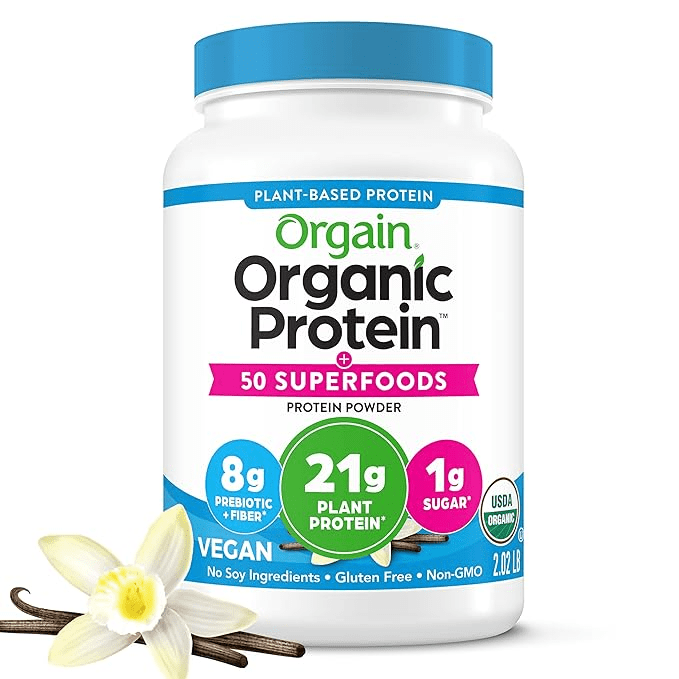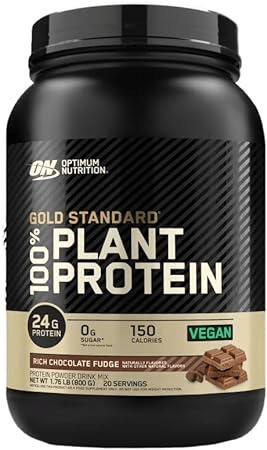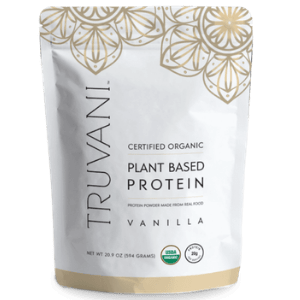The most effective protein powders to add to your weight loss routine.
Most people hear the words, “protein powder” and picture bodybuilders, hulking frames, or a massive forearm reaching into a tub of beige powder.
But in addition to building muscle, protein is also vital to maintaining energy, sleep, and nutrient transport. Surprisingly, it’s an incredibly effective tool to add to your weight-loss regimen. So, how can something people actually take to bulk up also help you trim down?
For starters, protein helps kickstart the metabolism. It also helps keep fat-burning muscles in tip-top shape and curbs food cravings between meals.
For these reasons, men and women everywhere are looking at protein powders in a new light. Needless to say, not all protein powders are created equal, so if your goal is to maintain a healthy weight, you’ll want to avoid things like added sugar, empty calories, and subpar ingredients.
At our site, we compiled extensive research to find the best protein powders on the market today. We’ll break down which ingredients to look for and what to avoid to meet your goals — plus, find out which 5 protein powders we deemed BEST in class of 2024!
What To Expect From A Quality Protein Powder
What Are The Different Types Of Protein?
There are many foodstuffs in the world that contain protein, from meat and fish to eggs, nuts, and dairy. But when it comes to supplemental protein, there are two that dominate the market: whey and plant-based.

Whey Or Nay?
Whey and its close cousin, casein, are the most common types of dairy-derived protein powders on the market and the protein of choice for “getting swole.”
But it’s not all it’s cracked up to be, especially for those who are sensitive to dairy and managing weight. Whey powders often contain added sugar — up to 20g/serving! — as well as milk sugars that can cause cramps, bloating, and stomach irritation.
Lean, Green, (Complete?) Protein
The best plant proteins combine all nine essential amino acids to create a complete protein. These amino acids are critical for balancing weight, sustaining muscle tone, smooth digestion, and promoting satiety between meals.
While mostly found in meat and dairy, finding the right plant-based complete protein is so important for women’s health and a healthy weight management routine. They’re rich in fiber, and supply key vitamins and minerals, like iron and calcium.
Best For Weight Management: Plant Protein
Based on our research, plant-based protein powders have a clear edge over whey and casein when it comes to supporting weight management. But before you pony up to the first plant-based protein you see, you’ll want to make sure it meets certain criteria.
For best results, look for a plant-based protein blend that combines a diverse source of plant proteins and superfoods. This will help ensure you are getting a complete and nutritious protein supplement. We’ve listed some of the best plant proteins and superfoods in the box below.
Best Sources Of Plant Protein
Peas are one of a handful of plant sources that contain all 9 essential amino acids. In a 12-week study comparing the effects of pea protein and whey on muscle recovery, scientists discovered pea protein slightly outperformed whey.
Brown rice protein is highly absorbable, making it ideal for a speedy post-workout recovery. It’s also hypoallergenic and contributes to healthy weight management.
These protein-rich superfoods are packed with antioxidants and plant fiber, and a good source of magnesium to boot.
This Peruvian superfood is no joke. In addition to protein, sacha inchi is packed with omega fatty acids and vitamin E and has been linked to healthy weight management.
What To Avoid
The best way to ensure you get a complete amino acid profile is to opt for a plant protein blend.
High intakes of hydrogenated oils have been linked to insulin resistance and poor blood sugar control.
Sugar may help with the taste, but it offers almost no nutritional value. Plus, any sugar you don’t immediately use is stored as fat.
Soy lecithin is often found in cheap, low-grade protein powders to enhance texture and “creaminess.” Most of the controversy surrounding this ingredient stems from the overwhelming majority of U.S. soy crops being genetically modified, containing harsh residual pesticides and disrupting nutrient absorption.
Frequently Asked Questions
Why do we need protein?
Protein is one of the three macronutrients we need for energy and to maintain our body’s structures. But its importance doesn’t stop there – protein helps build and repair muscles, digest food, support our immune system, and maintain healthy bones, making it an extremely necessary part of nutrition.
Curbs hunger cravings
Just like anyone else, women need to eat an adequate amount of protein for daily functions. Protein offers additional benefits to women, promoting healthy hair, skin, and nails, as well as reducing cravings in between meals.
Does protein make women bulky?
Protein supports the growth of lean muscle mass, but you won’t sprout bulging muscles just from hitting your calculated daily protein intake. Protein and weight-lifting go hand-in-hand, and no one is getting bulky without trying.
How much protein do you need to eat in a day?
If you’re searching for a healthy protein intake, you may find a lot of mixed results – and the amount of protein you want to eat in a day can depend on your fitness goals. However, a general rule of thumb is 0.8 g of protein per kg of body weight, or 0.36 g per pound.
Can you eat too much protein?
Like anything we eat, there is a limit between a healthy amount and overdoing it – protein is no exception. If you’re eating an excessive amount of protein daily, you may experience weight gain, dehydration, diarrhea, or constipation.
Top 3 Plant-Based Protein Powders Of 2024

A+
Overall Grade
PROS
CONS
The Bottom Line
Organic Protein & Superfoods uses a proprietary blend of pea protein, brown rice, and chia seeds. And if you get excited over superfoods, this may be the product for you (it contains a staggering 50 of them!)
Like others on this list, it’s also certified organic, non-GMO, gluten and soy free, vegan, and has zero added sugar. This product comes in chocolate and vanilla (unfortunately, neither one is keto or paleo friendly).
To be sure, few proteins on this list can compete with the sheer number of superfoods in this product, however, it failed to meet our criteria in some important areas.
For starters, it lacks a prebiotic, which is important for digestive health. It’s also a bit on the heavier side compared to others on this list at 160 cal/serving, which isn’t too extreme considering you’re also getting 21g of protein. Orgain offers a 30-day return policy.

A
Overall Grade
PROS
CONS
The Bottom Line
This formula includes pea protein, fava bean isolate, and rice protein concentrate. Each serving contains 24g of protein at just 150 calories.
It’s also keto and paleo friendly, soy and gluten free, sugar free, and non-GMO and comes in a tasty vanilla flavor.
Unfortunately, this product is neither certified organic. Optimium Nutrition offers 30-day return policy

A
Overall Grade
PROS
CONS
The Bottom Line
Rounding off our list is Truvani’s Plant Based Protein. It’s made with a nutritious blend of pea, pumpkin seed, and chia seed proteins.
Like others on our list, it’s also certified organic, non-GMO, gluten and soy free, keto (but not paleo) friendly, 100% vegan and available in 4 different flavors. Each serving contains 20g of protein at 130 calories (protein and calorie content varies with flavor).
We appreciate the simplicity of this product and it’s an all-around solid choice, especially if you’re new to plant-based protein powders. However, it also lacks pre- or probiotics, and may be a turn-off for people looking for an under-100-calorie protein. Truvani offers a 30-day return policy.
CITATIONS
- Hoffman JR, Falvo MJ. Protein – Which is Best?. J Sports Sci Med. 2004;3(3):118-130. Published 2004 Sep 1.
- Appel LJ, et al. Effects of protein, monounsaturated fat, and carbohydrate intake on blood pressure and serum lipids: results of the OmniHeart randomized trial. JAMA. 2005 Nov
- Ho MH, Wong WH, Chang C. Clinical spectrum of food allergies: a comprehensive review. Clin Rev Allergy Immunol. 2014 Jun
- Babault N, et al. Pea proteins oral supplementation promotes muscle thickness gains during resistance training: a double-blind, randomized, Placebo-controlled clinical trial vs. Whey protein. J Int Soc Sports Nutr. 2015 Jan 21
- Haug A, Høstmark AT, Harstad OM. Bovine milk in human nutrition–a review. Lipids Health Dis. 2007;6:25. Published 2007 Sep 25. doi:10.1186/1476-511X-6-25
- Legumes and pulses. (2020, October 16). Retrieved March 24, 2022
- https://www.consumerreports.org/media-room/press-releases/2010/06/investigation-tests-reveal-contaminants-in-many-protein-drinks/
- https://pubmed.ncbi.nlm.nih.gov/1503071/
- https://www.ncbi.nlm.nih.gov/pmc/articles/PMC6963490/
- https://www.ncbi.nlm.nih.gov/pmc/articles/PMC7399875/
- https://pubmed.ncbi.nlm.nih.gov/31339008/



